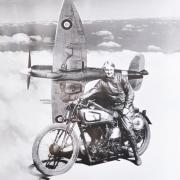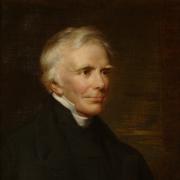When Dave Henson stepped on an IED in Afghanistan, his life could have been over. But out of adversity came a new direction and athletics glory. He tells Natalie French about his new life
Five years after losing both legs to an Improvised Explosive Device (IED) in Afghanistan’s Helmand Provence, Dave Henson ran his way to a bronze medal at the Rio 2016 Paralympics. This is one man who epitomises strong-mindedness.
Having grown up in Southampton, attending St. George’s Catholic Boys School in Swaythling, Dave moved away for university before joining the British Army. He was deployed to Afghanistan as a Royal Engineer Search Adviser, leading a team hunting for the deadly IEDs.
Recalling the day in February 2011 that irrevocably changed the course of his life while he led a team searching two compounds in Helmand, Dave says: “I remember walking across the compound to gain visual contact with our infantry protection before walking back. The next thing I remember I was on the floor and managed to get myself seated. I looked down and saw my legs were in pieces – skin and muscle hanging off and bones poking out. I started screaming, I don’t think it was pain at that point, the adrenaline kept the pain off for a few minutes.”
“My Team Commander came into my field of view and I managed to get a check on my emotions. I kept saying to him what he needed to do – get the helicopter, make comms’ with HQ, get the photos. In reality, he was all over it. I was only saying it to keep myself distracted.”
“The boys saved my life and stopped the bleeding and we lay there smoking cigarettes while we waited for the helicopter. It felt like a lifetime but in reality I was on the operating table in the field hospital 37 minutes after I was injured.”
Dave, who passed out of Sandhurst as a second lieutenant in 2008, was aware of the risks he was taking as he led the patrol to clear IEDs: “Deploying to a war zone inevitably comes with risk and you can’t help but think about those before you leave. Sometimes I found myself wondering what I would do if I found myself in that kind of situation and that little bit of pre-preparedness really helped.”
“When it happened for real, part of me almost felt like I had expected it and it was just another challenge to overcome. Obviously there were challenges and the early days in hospital were especially difficult. But the thing with this kind of injury in the military is that, fortunately or unfortunately - depending on your point of view - you are never alone in what you’re going through. You get through it as a team and I count myself so fortunate that this happened, as over the course of my rehab, and beyond, I’ve met some incredible people and made lifelong friends, despite the fact we may never have seen each other’s toes!”
Dave had his right leg amputated above the knee and his left leg amputated through the knee, but even after this ordeal his sense of humour, resolve and intensive rehabilitation at the Defence Medical Rehabilitation Centre, Headley Court, saw him back walking on full height prosthetic legs in 14 weeks.
He says: “You have to stay positive in these situations, there’s no other choice. It’s a simple yes or no situation. Has this happened? Yes. Can you change it? No. Well let’s make the most of it then.”
That’s what he did, turning to the love of sport he had in the military: “It’s a familiar concept in an unfamiliar situation and the physical and psychological benefits sport delivers are huge.”
“The team at Headley Court encourage sport participation from as early as your wounds allow. I took to swimming first off, as my family were taking part in a series of challenges to raise money for charity and I wanted to do those with them. When I first got back in the pool it was a little strange as my balance in the water was all off, but once I’d got used to it, it was very liberating - especially in open water. No one knew I didn’t have any legs, I was just another swimmer, another competitor and I think that probably represented the first time I didn’t feel disabled any more - just adapted.”
He went on to captain the British Armed Forces team and claim gold in the 200m and the sitting volleyball at the 2014 Invictus Games in London – an international Paralympic-style event, created by Prince Harry, in which wounded, injured or sick armed services personnel compete. “I’d taken part in some sport competitions before in the States as part of my rehab and I understood the value of the concept and what it had to offer so I could help other competitors to get the most out of it, and help spread the message about what we were doing.”
“Winning gold in the London 2014 Invictus Games was an incredible highlight for me - it represented overcoming adversity and it really marked the completion of my rehabilitation - it showed me and my friends and family that I was ok and moving forward.”
“My sprint coach, Roger Keller and Tom Henson, my strength coach, have been absolutely pivotal in my success on the track, but much more than that - they’ve shown me who I can be outside of the military. That’s the biggest thing I struggled with - the loss of career and the identity that comes with it. They showed me who I could become, trusted and believed in me and we did it.”
In what was a momentous 2014 for Dave, he left the army with the rank of Captain and was awarded the MBE. Fast forward to 2016, and his dedication and self-belief earned him another Invictus Games 200m gold in Florida and the bronze medal in the 200m sprint (T42) at the Rio Paralympics, behind British gold medalist, Richard Whitehead. “I was ecstatic. It made all the early mornings, all the pain, worth it. The games were amazing, such a surreal thing to be a part of. I’ve grown up watching Olympics and later, Paralympics and getting a medal is something that happens to other people, not me. It took a long time to get my head around what had happened!”
Becoming a blade runner was also par for the course, but it’s a feeling Dave is still getting used to, despite his achievements.
“It’s so different to how I ran for 26 years,” he says, “forgetting how you ran is the most difficult part. The way I ran was the way I ran, I didn’t need to think about it, I just did it.”
“With the blades, I have to think about every step to stop my body from trying to do what it has been, without my conscious input, for such a long time. This is amplified at speed and particularly when I want to accelerate - if my concentration isn’t bang on I can switch back to old ways and it doesn’t always end so well.”
Now that Paralympic sport is so competitive, the training is very tough, but Dave says: “To be up there with the best you have to train like it. It’s hard, it’s tiring, it’s painful but you do it because the end goal is there and it’s worth it.”
Returning home, Dave was blown away by the incredible welcome: “As an athlete you’re stuck in a bubble and you’re not really exposed to any of the hype or build up or highlight that you see when you watch it on the television. I’m still getting to grips with the magnitude of the event and how many people saw it and all the different things and messages that people took from the athletes. It was a very inspiring event to be a part of and it’s so positive that so many people also take inspiration from it.”
Any plans to tackle Tokyo 2020? “I have to listen to my body when it comes to athletics, but I’m preparing the foundations for an assault on the Tokyo Paralympics. Whether or not it’s feasible remains to be seen.”
Now back home near Whiteley, Dave is preparing for the year ahead, splitting his training between the Mountbatten Centre in Portsmouth, the Sports Centre in Southampton and the home of Army Sport in Aldershot. With the World Para Athletics Championships being held in London’s Olympic Stadium in July, he says: “It would be fantastic to compete on home turf in that stadium, with that incredible home crowd.”
But there’s one challenge that tops them all, as Dave and wife Hayley welcomed their first child, daughter Emily, into the world in 2014: “Fatherhood is by far and away the most challenging, rewarding, exciting, scary thing that I’ve ever got into. It is a true gift.”
I’m inspired! Sign me up…
“There’s a really good para-athletics set up at Portsmouth Athletics club (portsmouthathletic.co.uk) so if people are interested in that they should get in touch,” advised Dave. “If there are other sports they want to get into then you can find out loads of information on that sport’s governing body website such as England Athletics (englandathletics.org) or BBC Get Inspired (bbc.co.uk/sport/get-inspired). Facilities are being improved all the time as more and more people with disabilities get into sport.”
More…
• 37 famous people who went to university in Hampshire - Universities in Hampshire have taught a number of students who eventually went on to find fame in the future. Some slightly more left field than others...



























